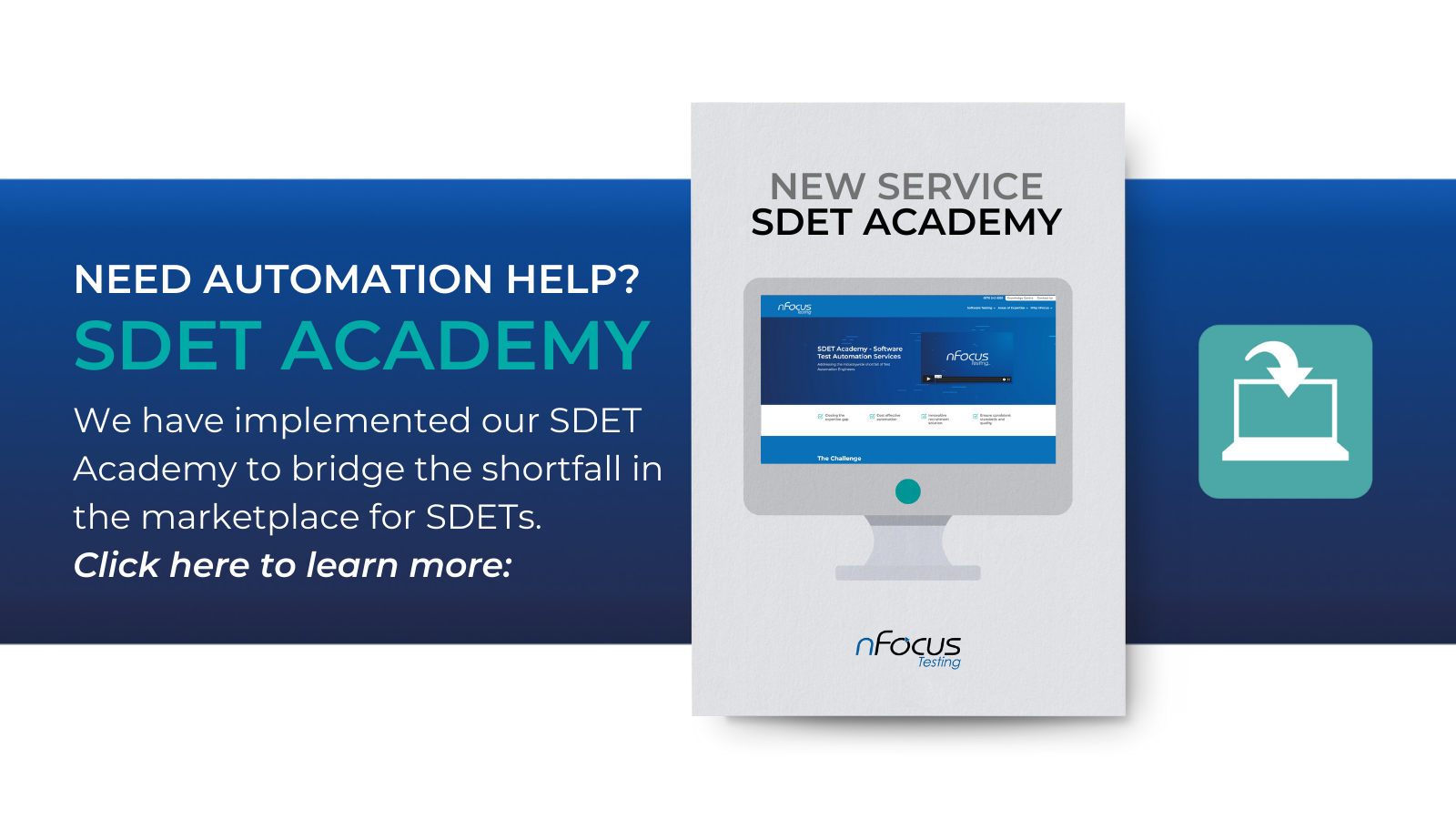Exploring the Essential Skills SDET’s need to become a Good Communicator
After reading a previous blog that covered important basics for a career in software testing, ‘What makes an Effective Test Consultant?’; it felt to me that a more detailed look at one of these areas was needed to help illustrate how important soft skills are for people starting out in this space.

Something that the selection team have noticed from the nFocus SDET recruitment days is how crucial communication skills are for a candidate. The decision of who to select or not can be determined simply by confidence and approachability - or for many the lack of either. It goes without saying a fearful or monotonous candidate will be overlooked for a more composed and enthusiastic one.
As little as one conversation with a person can build a lasting impression, therefore, to ensure selection and aid a successful career in testing, your communication will need to be effective.
So, how can an SDET Graduate (or anyone new to a career in testing) ensure that their communication will not let them down? I will attempt to explain by considering how different types of communication are used in consultancy practices and how a soft skill can best be utilised...
A SDET Graduate can be expected to be involved in consultancy work very early in their career, interacting with client or third-party resource in workshops. Including planning sessions, project updates and sometimes general team meetings; either face-to-face or virtual. So, the most common form of communication seems like a good place to start...
Verbal
In the workplace, the idea of effective communication varies depending on the circumstances. For example, when leading a presentation; a more professional but authentic use of speech is expected. Your message should be clear and ideas are articulated concisely.
Ideally, that message should resemble a straight line, no digression from the main focus. Also, no distraction by irrelevant topics to the one being discussed. It's key to remember; more talking does not mean better communication. The quality of the message is far more important than the quantity of words spoken.
An important concept which can be overlooked is use of terminology and vocabulary. Although, it may sound strange refraining from overly complicated phrasing will help to keep an audience enticed as they are not stuck pondering over the meaning of a word you used. It’s important for your audience to remain captivated, so don’t make it difficult for them. Constant sophisticated and confusing language can be more effective at putting someone to sleep than a lullaby! By no means, limit or oversimplify your vocabulary. Just keep it succinct so it's easy to follow.
Similarly, humour when communicating is a double-edged sword to a candidate or the current SDET Graduate Consultant. It can be effective at holding engagement and lightening the mood. However, if overused; it can become tedious. It can also have the potential to distract from the point you are explaining and can make your presentation appear informal. Remember that your career is in testing, not comedy. An occasional joke is acceptable but any more than that, you’ll have colleagues questioning if they got the correct room upon arrival.
Finally, pay attention to the way you phrase your sentences to avoid conveying aggression or disrespect. Having good etiquette and politeness will show respect for other colleagues as well for yourself. Remember, first impressions have lasting effects. Even if unintentional, aggressive tones will not be received well and may paint a bad perception for yourself. A good way to achieve this is to rehearse what you plan to say in meetings or presentations as this will ensure no deviation from the main point. Your message will continue to resemble a straight line.
Good communication shows confidence and motivation so therefore, builds trust and the ability to resolve conflicts. For a hopeful selectee or for a current SDET Graduate Consultant, having these attributes could ensure you some future opportunities.
Once a testing phase gets underway, either in planning or execution; a SDET Graduate will be expected to construct test scripts, potentially contribute to test plans or report on progress. This naturally leads us onto...
Visuals
Visuals are used to express ideas and combined with good verbal communication; they can convey a message very effectively. Forbes claims 65% of people are visual learners, so there’s no harm in adding a few visuals to communicate your message especially when 90% of information is transmitted to the brain visually.
My personal favourite advantage of using visuals is its applicability to every person in the room. Images and diagrams are universal in the sense anyone from any background can understand and interpret them. There is no language barrier and they are simple to comprehend. Visuals will add inclusivity as well as interest to a presentation.
There are four main types of visual communication which I will highlight:
1. Graphics - illustrations or drawings
2. Typography - typefaces or the design of letters and numbers on a page
3. Layout - the arrangement on a page
4. Motion - add dynamic experience to a presentation
Each of these can add individuality to a presentation/report which allow you to be authentic and original. Be sure to use them wisely though. If the visuals used are unhelpful or irrelevant, it can aid confusion and make your presentation appear messy.
As important as outward communication is to being effective in situations such as workshops, meetings and face-to-face conversations, it's just as important to...
Listen
A lot can be learned through listening to a person. However good you are or how experienced you are, good Test Consultant should always be prepared to learn something. Any colleague has the potential to teach you something useful and shared knowledge can be more powerful.
Be aware of your body language when listening as it can convey emotions in abundance, even without the addition of words. If you’re visibly fidgeting or restless, you’re repeatedly yawning or resting head on the table; you are labelling yourself as heavily disinterested. There may as well be a big red sign above your head saying, “I do not care for what you have to say”. This could be considered disrespectful to the person relaying the information (for example, in a presentation) and paint a poor image of you as an employee.
I keep referring to the idea of first impressions but reluctant to engage in any topics may present you as self-centred and ignorant. Essentially, by maintaining eye contact, nods of understanding and consistent attention on the speaker will make it clear that you are interested and invested, even if you would rather watch paint dry.
Also, being attentive will help you observe how a person acts, thinks and reacts in different situations which will help you to frame any responses you may need to provide.
It can also be important to follow up after a meeting. Taking action in this way shows inquisitiveness and clearly shows that you were listening. This can be done through emailing, texting or just asking questions at the end of the presentation. Which leads us into situations such as attending workshops or planning meetings, where it can be very useful for a Test Consultant to be confident…
Asking Questions
It can be argued that curiosity defines a workplace and this intrigue is portrayed through asking questions. However, as someone lacking experience in the workplace, I can understand the concept of asking questions is daunting. No matter how confused I am, I will never put my hand up and ask for clarification; possibly because I don’t want my peers around me to think I’m incapable of understanding “easy” concepts.
However, without questions, progress can be stifled and your level of understanding will be capped. Lacking comprehension of concepts will cause a lack of confidence in your ability and possibly showing signs of disinterest. So, it’s always better to ask questions.
Using open-ended questions will gain insight without pushing for any specific answer. It helps to make the person you are asking feel seen, heard and engaged with. As a questioner, I recommend not to attempt to change or control the conversation. Your turn-taking skills should be concise and significantly less than the person presenting or speaking.
In Summary
When being interviewed or assessed for a job in testing, my takeaway message for you would be outwardly communicate with authenticity and assertiveness. Inwardly communicate with respect and intrigue. Where possible, prepare what you say and how you will say it but don’t be robotic. If a company wanted to hire a robot, they could easily do so.
Don’t be afraid to ask questions! It's said that the smartest people in the room are the ones constantly asking questions so don’t hesitate to do so.
I am aware many of these things are not taught to you at university and it's far easier said than done to be confident and approachable when nervous. Nonetheless, doing so will allow you to stand out from other candidates and will give you access to an abundance of opportunities.
Here at nFocus, we look to develop the soft skills of our SDET Graduate Consultants so that they can effectively support your automation journey. If you’d like to know more about our SDET Academy, get in touch on 0333 696 1001 or info@nfocus.co.uk.
Special thanks to our guest writers Richard and Beth Turrall for their work on this blog.








.png)
